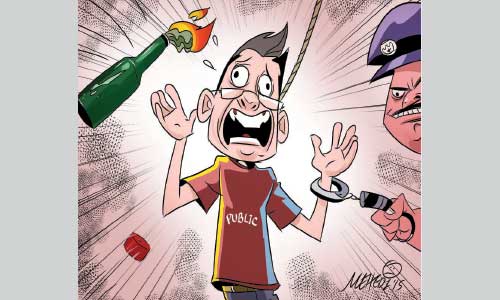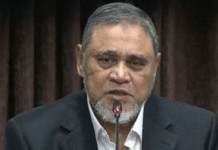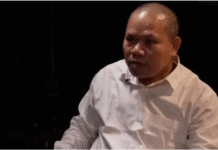Mustafizur Rahman
A sense of insecurity, triggered by arson attack on transports on the one hand and police excesses on the other, has seized the people in general across the country, affecting their mobility as the anti-government blockade continues for almost two and a half months.
Although there are streams of traffic in the city streets, and government and private offices are working, many schools have remained closed fearing bomb attacks while some have asked their students to attend classes in casual dresses as the protracted political agitation has paralysed academic activities and businesses, said sufferers, including guardians and businessmen.
‘I have suspended my evening walk. There is no security outside. Crude bombs are often thrown at different places in the city. Police also harass common people in the name of maintaining order, further terrifying the people going out on different purposes,’ a senior government official said.
Most people in the city have limited their day-to-day life to routine activities and suspended outings with their families on weekends fearing hit-and-run attacks by pickets anytime and anywhere, said a number of people from different walks of life.
Officials at the secretariat said their private life had been seriously affected by the blockade and intermittent hartals with their children idling away their time at home.
Another official said his father, who had a cardiac operation one year back, could not travel to Dhaka from Jessore in February for his routine follow-up at a specialised government hospital in the capital.
‘I asked him not to come before the situation improves…,’ the official said.
Crowds at public places, including markets in Dhaka and elsewhere, were thinner than usual, particularly in the evening, witnesses said.
Asked for comments on the situation, state minister for labour Md Mujibul Haque said that life was getting normal despite the blockade. But he admitted that that there was panic among the people.
Many believe that ‘wholesale arrests’ in different areas and incidents of disappearances have also intensified the sense of insecurity among the citizens.
‘There is no reason to be panicked. This is positive that common people have come up defying the blockade and hartals and law enforcement agencies are doing their best to ensure security of the people,’ state minister for home Asaduzzaman Khan told New Age on Tuesday.
About the police excesses, he said police might pick up one or two innocent people while arresting 10 suspected troublemakers, but released those proved innocent. ‘We take action in case of any excesses by police,’ the junior minister added.
At least 124 people were killed in the political violence after the Bangladesh Nationalist Party-led opposition alliance called the nonstop blockade on January 5. Of the victims, 64 were killed in firebomb attacks and around 40, mostly BNP-Jamaat activists, were either killed in police shootouts or in custody during the blockade pressing for a fresh election under a non-party interim government.
Over 15,000 people, mostly BNP-Jamaat leaders and activists, were arrested so far while 1,600 cases were filed in connection with the violence since January 5, according to police.
A parent in Dhaka said that she had to wait in anxiety until she brought her 11-year old child home safely from school.
‘This is a terrible situation. The school authorities have decided to hold classes and asked the students not to come in uniforms during the hartal. We are caught on the horns of dilemma,’ the parent said.
A schoolteacher said his authorities had asked the students not to wear uniforms on security ground so that pickets could not easily spot which schools were open on the hartal days.
Although the government on March 12 lifted the restrictions on night-time operation of passenger buses on long routes, imposed over a month earlier amid arson attacks on transports, the intercity buses were leaving terminals with passengers less than expected.
Bangladesh Bus-Truck Owners’ Association vice-president and Shyamoli Paribahan managing director Ramesh Chandra Ghosh said they were operating one third of the buses in their fleet on long routes after the ban was relaxed on Thursday.
But passengers were still panicked and so few people were travelling in long-route buses at night.
Shopkeepers in the city said they were counting losses everyday due to the prolonged blockade as the number of customers had declined significantly.
Federation of Bangladesh Chambers of Commerce and Industry president Kazi Akram Uddin Ahmed said that businesspeople felt helpless amid ‘destructive’ political programmes.
At a discussion in the city on Monday, the business community leader said that the extent of losses caused by the ongoing blockade and hartals was equivalent of half of the national budget and it would be difficult for the economy to recover.
FBCCI estimates a financial loss of Tk 2,700 crore for one day’s hartal and blockade.
Although there are streams of traffic in the city streets, and government and private offices are working, many schools have remained closed fearing bomb attacks while some have asked their students to attend classes in casual dresses as the protracted political agitation has paralysed academic activities and businesses, said sufferers, including guardians and businessmen.
‘I have suspended my evening walk. There is no security outside. Crude bombs are often thrown at different places in the city. Police also harass common people in the name of maintaining order, further terrifying the people going out on different purposes,’ a senior government official said.
Most people in the city have limited their day-to-day life to routine activities and suspended outings with their families on weekends fearing hit-and-run attacks by pickets anytime and anywhere, said a number of people from different walks of life.
Officials at the secretariat said their private life had been seriously affected by the blockade and intermittent hartals with their children idling away their time at home.
Another official said his father, who had a cardiac operation one year back, could not travel to Dhaka from Jessore in February for his routine follow-up at a specialised government hospital in the capital.
‘I asked him not to come before the situation improves…,’ the official said.
Crowds at public places, including markets in Dhaka and elsewhere, were thinner than usual, particularly in the evening, witnesses said.
Asked for comments on the situation, state minister for labour Md Mujibul Haque said that life was getting normal despite the blockade. But he admitted that that there was panic among the people.
Many believe that ‘wholesale arrests’ in different areas and incidents of disappearances have also intensified the sense of insecurity among the citizens.
‘There is no reason to be panicked. This is positive that common people have come up defying the blockade and hartals and law enforcement agencies are doing their best to ensure security of the people,’ state minister for home Asaduzzaman Khan told New Age on Tuesday.
About the police excesses, he said police might pick up one or two innocent people while arresting 10 suspected troublemakers, but released those proved innocent. ‘We take action in case of any excesses by police,’ the junior minister added.
At least 124 people were killed in the political violence after the Bangladesh Nationalist Party-led opposition alliance called the nonstop blockade on January 5. Of the victims, 64 were killed in firebomb attacks and around 40, mostly BNP-Jamaat activists, were either killed in police shootouts or in custody during the blockade pressing for a fresh election under a non-party interim government.
Over 15,000 people, mostly BNP-Jamaat leaders and activists, were arrested so far while 1,600 cases were filed in connection with the violence since January 5, according to police.
A parent in Dhaka said that she had to wait in anxiety until she brought her 11-year old child home safely from school.
‘This is a terrible situation. The school authorities have decided to hold classes and asked the students not to come in uniforms during the hartal. We are caught on the horns of dilemma,’ the parent said.
A schoolteacher said his authorities had asked the students not to wear uniforms on security ground so that pickets could not easily spot which schools were open on the hartal days.
Although the government on March 12 lifted the restrictions on night-time operation of passenger buses on long routes, imposed over a month earlier amid arson attacks on transports, the intercity buses were leaving terminals with passengers less than expected.
Bangladesh Bus-Truck Owners’ Association vice-president and Shyamoli Paribahan managing director Ramesh Chandra Ghosh said they were operating one third of the buses in their fleet on long routes after the ban was relaxed on Thursday.
But passengers were still panicked and so few people were travelling in long-route buses at night.
Shopkeepers in the city said they were counting losses everyday due to the prolonged blockade as the number of customers had declined significantly.
Federation of Bangladesh Chambers of Commerce and Industry president Kazi Akram Uddin Ahmed said that businesspeople felt helpless amid ‘destructive’ political programmes.
At a discussion in the city on Monday, the business community leader said that the extent of losses caused by the ongoing blockade and hartals was equivalent of half of the national budget and it would be difficult for the economy to recover.
FBCCI estimates a financial loss of Tk 2,700 crore for one day’s hartal and blockade.
Source: New Age










